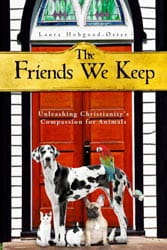 When I recently mentioned to a friend that our Book Club was featuring a new book on the history of animals in Christianity, his first reaction was of grim surprise—animals haven't had it very good in our tradition, meeting their fate more often than not on altars of sacrifice to God. Fortunately, in an engaging new book,The Friends We Keep: Unleashing Christianity's Compassion for Animals, author Laura Hobgood-Oster proves that's he only partly right, and goes so far as to claim that Christianity is actually "good news" for animals.
When I recently mentioned to a friend that our Book Club was featuring a new book on the history of animals in Christianity, his first reaction was of grim surprise—animals haven't had it very good in our tradition, meeting their fate more often than not on altars of sacrifice to God. Fortunately, in an engaging new book,The Friends We Keep: Unleashing Christianity's Compassion for Animals, author Laura Hobgood-Oster proves that's he only partly right, and goes so far as to claim that Christianity is actually "good news" for animals.
Hobgood-Oster, a Professor of Religion and Environmental Studies at Southwestern University, has combined her academic expertise as a religious historian with her passion for animals to make a compelling case for why Christians should care deeply about the issues animals face in our time. Following up to her first book, Holy Dogs & Asses: Animals in the Christian Tradition, The Friends We Keep mines the Bible and the Christian tradition for stories that serve to challenge us to consider our relationship with animals—pets or otherwise—as a social justice issue on par with other urgent concerns of today.
Hobgood-Oster spoke with us recently about faith and animal advocacy, the top issues concerning animals today and how we can help, animals and the afterlife, and the one simple step each of us can take to change the lives of a huge number of animals.
Good morning, Laura! Thanks for taking some time to talk to us about The Friends We Keep. I'll just jump right in with the central thesis of your book, which is that Christianity can be "good news" for animals today. What leads you to make that claim?
Thank you as well, I'm so glad to have this opportunity to talk with you about the book. I've been challenged frequently about that claim, but I stick to it! Christianity has not always been good news for animals and, in the contemporary world, the tradition has a long way to go. But if you look at the whole sweep of Christian history there are numerous resources that speak to the inclusion of animals in worship, in circles of compassion, in stories of healing, and more.
Animals are companions for saints, they listen to the gospel and respond, they offer hospitality, and they are obviously embraced by God for who they are regardless of their role in relationship to humans. So animals start to appear everywhere if you just look for them. With that in mind, Christianity can be good news for animals today. But it does mean that Christianity will have to rethink its dominant positions regarding animals and embrace some of its history again.
 So it occurred to me as I was walking my new dog this morning, that I'm reading your book much differently now than I might have before I was a pet-owner. Your endearing stories of animals in the history of Christianity—contrasted with how often animals are mistreated in our world today—resonated all the more loudly for me now that I've fallen in love with my dog. I imagine writing this book was personal for you too. What compelled you to write about the responsibility of Christians, and people of faith in general, to show more compassion to animals?
So it occurred to me as I was walking my new dog this morning, that I'm reading your book much differently now than I might have before I was a pet-owner. Your endearing stories of animals in the history of Christianity—contrasted with how often animals are mistreated in our world today—resonated all the more loudly for me now that I've fallen in love with my dog. I imagine writing this book was personal for you too. What compelled you to write about the responsibility of Christians, and people of faith in general, to show more compassion to animals?
I can't imagine life without the beauty of other animals. From the time I was young I felt a connection to animals and also connected them to Christianity. We would go on summer church camp to a wonderful beach where horses ran free, it was fabulous. Our family would always bury any pets who died and have a simple service for them. As an adult I've been so lucky to become involved with both dog rescue and with advocacy for food animals (those who are suffering in factory farms). So, in my opinion, it is all connected. If Christianity (and faith in general) calls for justice and compassion, why should that be narrowed to just humans (and, really, to just some humans—but that's a whole other issue).
Why did you decide to write this book now? Are we are at a particular tipping point on any animal issues that made this subject more urgent for you now?
In some ways I think we are at a tipping point. In terms of companion animals—dogs and cats in particular—there are more households in the U.S. now with dogs than with children under 18. This is for some complicated demographic reasons, including the aging population. But it's not a total anomaly; dogs have lived with humans for 30,000 years. I contend we wouldn't be here without them! So, that's one issue, companion animals hold an increasingly significant place in the lives of many people now.





